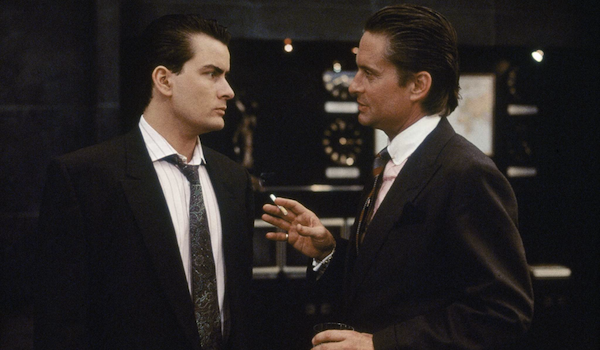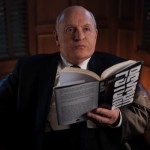Wall Street Review
Could there have been a worse time for me to watch Wall Street for the first time? After the job losses, corrupt CEOs, bailouts, and bonuses, how could I enjoy watching a film that celebrates that sort of culture? Because whatever sort of redemption the main character gets, whatever lesson we learn, Oliver Stone’s film celebrates—to a degree—the Wall Street culture that we as a society have reviled for the past year or so. Greed is good, or so says Gordon Gekko. But 20 years later, we’ve learned (or at least some of us have) that this is not the case. Greed is bad. Bad, bad, bad, bad, bad. This film, a so-called classic, is not much better.
Bud Fox (Charlie Sheen) is a rising star in world of finance. He starts out as a low level stock trader, but with some persistence, he gains the ultimate client, Gordon Gekko (Michael Douglas). Gekko, who only really contemplates one deal per day, is up to his eyes in money. He could stop investing anytime and live a lavish, luxurious life somewhere, but he can’t. He wants more. The information Bud gives him is privileged (it has to do with Bud’s blue-collar father’s company), so Gordon sees some potential in him. See, Gordon doesn’t play by the rules. He operates in information, and the more tight-lipped it is, the more intently he listens. He trains Bud in his ways, until the young man must make a choice between the lifestyle he’s always wanted and an honest day’s work, like his father (Martin Sheen) always preached.
Wall Street‘s biggest problem is the extremely unlikable nature of its two main characters, but it’s not the film’s only problem. It suffers from what I call “80s syndrome” (so many movies from this era are painfully dated from clothing, hairstyles, music, etc.). It tosses around these financial terms, which I don’t understand, and never bothers explaining them. In doing so, the film always stays an arm’s length away.
Another problem is the relationship between Bud and his father. In the beginning, we see Bud visiting his father at his favorite bar. It seems like they have a close relationship. His father pushes him, but it’s not unlike any father/son relationship. After a disagreement over a business deal, the two have it out, and Bud alludes to a past in which their relationship was troubled because his father ignored him. It just seems so out of place when the two are arguing over the ethics of business. For the rest of the film, their relationship is never consistant.
Things aren’t helped by Sheen’s sub-par performance. He’s decent in the beginning, portraying Bud as a determined young broker, but he’s not nearly as successful as Bud tries to regain his conscience. It’s a character arc full of cliches, and Sheen does nothing to elevate it above that.
The rest of the actors more successful. Michael Douglas won an Oscar for his portrayal of Gordon, one of cinema’s most famous villains. While I don’t think he’s close to that level, I would say he’s easily the best part of the movie. Martin Sheen is also quite good as Bud’s father. He represents the working class man who often gets taken advantage of by the likes of Bud and Gordon, so our sympathies immediately lie with him. However, I do think Stone made it far too easy for us to side with him. He’s just as cliched as Bud.
I really don’t understand the love for this film, nor do I understand the reason for a sequel over 20 years later. It’s sure as hell is timely, but I don’t know if moviegoers will want to spend time with these types of characters at a time like this. I will, but not because I want too. Perhaps it will offer something new, but if it’s anything like it’s predecessor, it will feature an uninteresting story chock full of dislikable, unoriginal characters.
















